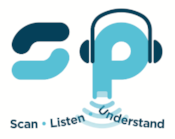When is it time to stop with literacy interventions and move to literacy strategies?
I recently had the great honour of speaking at The Education Show in Birmingham. I was up against Radio 2 DJ Simon Mayo so I was delighted to have a full house who wanted to hear me talk about preparing SEN students for life, not just for exams.
After the talk, I was by the Scanning Pens stand and a lady was being given a demonstration of how one of their products easily turns printed text into speech. It will read for you basically. A wondrous piece of assistive technology for people with dyslexia.
Anyway, this lady said she didn’t know what to think of it and she didn’t know if she liked it. Would it not make students lazy and stop them learning? I’m not going to lie, I think I did well not to respond with a lot of swear words. Instead I explained to her that not being able to read tends to be a bigger barrier to learning taking place. Also, people don’t struggle with reading because they are lazy – why are there still educators that think this? “Oh that will make them lazy readers.” Um, they don’t struggle with reading because they are lazy!!!
It got me to thinking about interventions in school, specifically literacy interventions – reading/writing/spelling. There are a wealth of literacy support interventions that are used in schools worldwide. Using these interventions often yields fantastic results and are absolutely the right thing to do.
Sometimes though we can keep using interventions and see minimal or no improvement but we keep trying, as we feel it’s the right thing to do. Should there come a time when we stop with interventions and look at supporting the difficulty with independent learning skills and assistive technology?
I have worked mainly with secondary aged students and we would still have year 9 students (14 year olds) completing literacy interventions – usually small group lesson withdrawal interventions. When undertaken in Year 7 these would have a good rate of improvement. Year 8 less so. Year 9 even less so. So why did we continue with these strategies?
Well at the time it was all we had really, that and TA support in lessons along with some differentiation. I remember the whole schools students being tested to see if they were an audio, visual or kinaesthetic learner. Their ‘style’ was written on the school registers so teachers knew. Now we know this was actually a pile of pants.
We must also question what continuing with literacy intervention after intervention, without major improvement, does for the self-esteem of a student? It’s similar to the to what we are seeing in post 16 students who have to keep taking English/Maths GCSE until they get a grade C. Apparently only 1 in 5 students eventually get the hallowed C but the impact on the other 4/5 students’ self-esteem is detrimental in my opinion, and in the opinion of many people who work in education. So many students feel they are stupid because they can’t pass Maths GCSE even though they are utterly brilliant and talented at so many other things.
We know enough about the brain and about Dyslexia that for some people their brain works differently, and they may never understand or be able to decode the English language. So why do we keep trying and insisting that they must? The energy and time spent by the pupil continuing with reading interventions could be better spent learning subject information or finding a miracle cure for some disease.
When students stop improving as a result of interventions, or where there is limited improvement, why don’t we think about teaching them strategies so their difficulties don’t hold them back. Provide and teach them to use assistive technology. Break down the barriers to their learning in class, in life. Improve their self-esteem, and in many cases their social standing, in school. This has all been proven to improve learning which improves academic performance.
We also shouldn’t just consider this at secondary level. There is now earlier diagnosis for dyslexia, and similar type disorders. Based on diagnostic assessment and in class evidence, could we consider learning strategies at a younger age? That is stop expecting them to be able to read to a certain level which they are likely never to achieve. Instead equip them for independent learning with a range of strategies and assistive technologies and let them get on with being brilliant and learning subject content.
Yes, I know this may be idealistic and I am not recommending we stop trying for all students. But we owe it to look at each student as an individual and decide what is best for them academically and emotionally. You wouldn’t keep giving a permanently paralysed person walking lessons, you would support them to live an independent life. Let’s look at doing the same for other SEN students as well.

